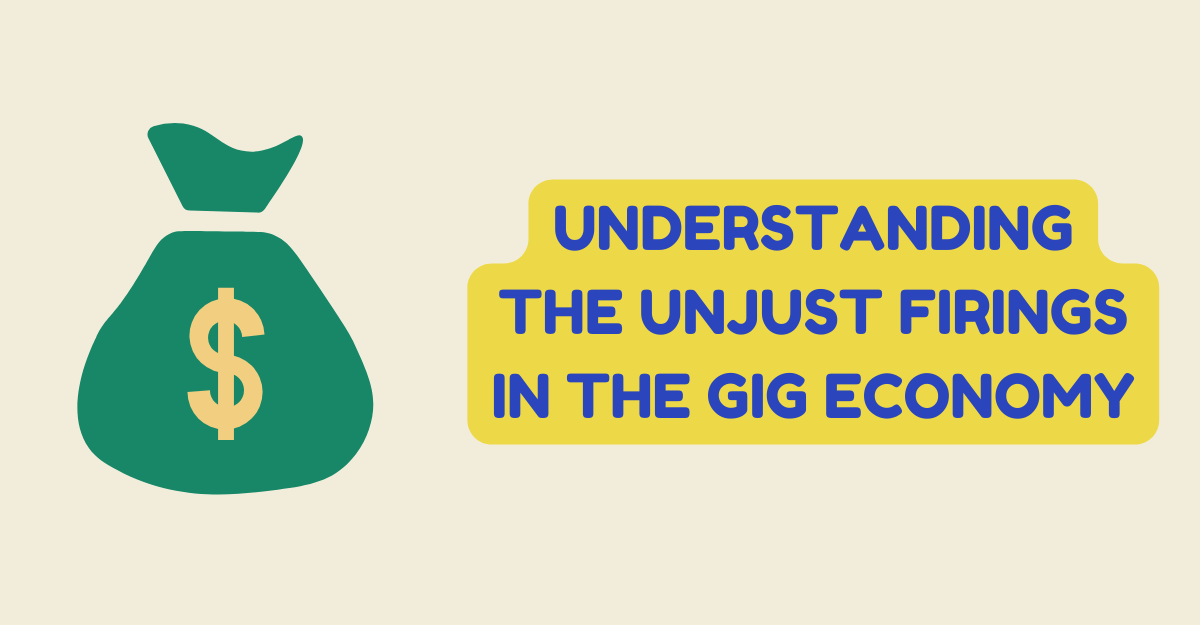
Understanding the Unjust Firings in the Gig Economy
The gig economy, initially celebrated for its freedom and flexibility, has revealed a darker side: unfair job terminations. Even though being an independent contractor may seem liberating, it often means feeling exposed and uncertain. A simple click, tap, or an unpredictable computer program can suddenly jeopardize the livelihoods of many.
A Common Occurrence
Meet Alex, a single dad who drives for Uber while taking care of his young son during late-night shifts. One morning, he woke up to a shocking message: “Your account has been deactivated.” No reasons, no way to appeal—just a sudden firing from the platform that was his only source of income. He begged for an explanation, tried to find out what went wrong, but the computer program stayed silent, offering only a confusing code as an excuse. Now, Alex is struggling with the possibility of unpaid bills, a hungry child, and an uncertain future—a casualty of the hidden dangers in the gig economy.
Alex’s experience is not uncommon. Many gig workers in delivery, ride-hailing, and other platform-based jobs face similar situations. Unfair computer programs, platform favoritism, and a lack of fair procedures create an unfair situation, leaving workers without the safety net that traditional jobs provide.
Issues with the Gig Economy Technology
The problem often stems from the mysterious computer programs these platforms use. Their internal workings are kept secret, and their decisions are rarely questioned. A single negative rating, a misunderstood GPS signal, or a glitch in the program can lead to deactivation—a digital mark that labels the worker as unemployable on the platform. The lack of human supervision makes the issue worse, forcing workers to beg for help from faceless bots and automated email replies, their requests disappearing into the digital void.
However, the real impact of these firings goes beyond the virtual realm. Take Sarah, a single mom who supports her family through freelance writing jobs. A sudden platform change, without any warning, made her entire body of work invisible to clients. Her income dropped, bills went unpaid, and the stress of an uncertain future took a toll on her well-being. Sarah’s experience reflects the financial and emotional devastation these firings cause, pushing vulnerable individuals further into uncertainty, their dreams crushed by the cold logic of algorithms.
The Legal Landscape
The legal landscape doesn’t offer much comfort either. Gig workers, considered independent contractors, often lack the protections that come with traditional employment. Unclear rules and confusing contract terms leave them at the mercy of the platforms, with their rights easily ignored in the name of digital convenience. The wrongful termination lawyers at Browne Employment Lawyers said this creates a divided workforce, where one group is shielded by strong legal protections, while the other is left vulnerable to the unpredictable forces of technology and corporate influence.
The impact of this injustice extends beyond individual lives, weakening the entire social fabric. When workers face insecurity and unfair treatment, it results in strained budgets, increased reliance on social safety nets, and a growing gap between those who have and those who do not. The gig economy, once seen as a solution for flexibility, risks becoming a source of instability and inequality.
Progressing Towards a Better Future
However, amidst these challenges, there are signs of hope. Worker advocacy groups are emerging, calling for transparency, fair procedures, and accountability in algorithms. Legislators are starting to pay attention, considering laws that would provide gig workers with the basic protections enjoyed by traditional employees. Platforms, under mounting pressure, are slowly moving toward more transparent and equitable practices.
The battle for a fair gig economy is ongoing and requires the collective efforts of workers, advocates, policymakers, and platforms themselves. We need algorithms that serve rather than dominate, clear transparency in platform policies, and fair mechanisms for resolving disputes. Only then can the potential for flexibility in the gig economy be fully realized without compromising the dignity and security of its participants.
The future of the gig economy is at a crossroads. One path leads to a dystopian world where workers are mere components in a digital machine, always at risk of arbitrary dismissal. The other path leads to a future where flexibility and opportunity coexist with fairness and human dignity. The choice is ours. Will we allow the shadows of unjust firings to engulf the gig economy, or will we step into the light and shape a future where all forms of work empower rather than exploit?






